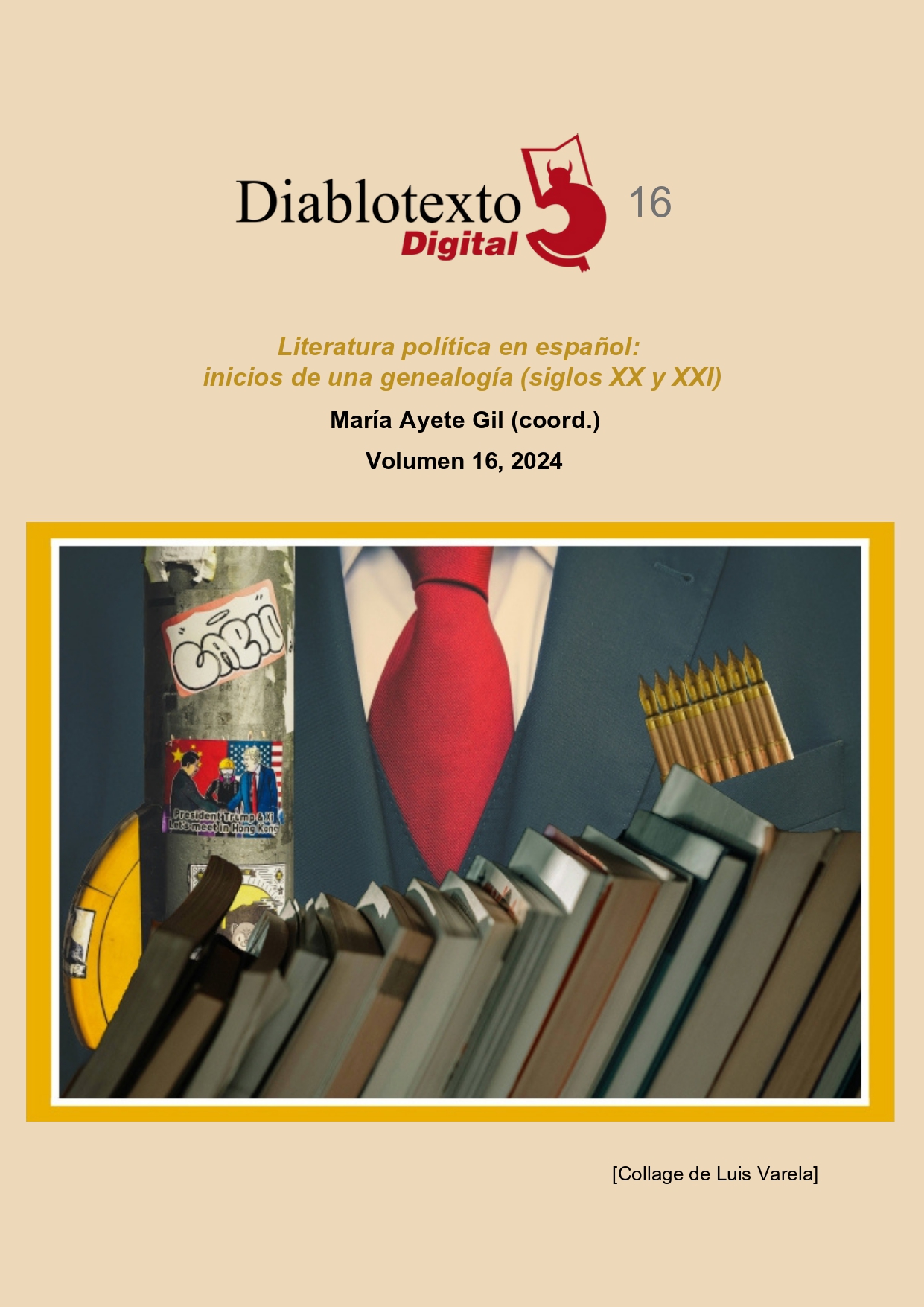Alienation and domestic work in Limpia, a political novel by Alia Trabucco Zerán
DOI:
https://doi.org/10.7203/diablotexto.16.29413Keywords:
Exploitation, working woman, free subject, subaltern voice Abstract
Abstract
A cultural object we can considerate political has to discover the way in a society is built. From XIX century we know that these forms of social organization have to be with economic ways of production, that is to say the exploitation of human beings who think they are free subjects. Marxist theoretical principles, the free subject of Juan Carlos Rodríguez and the Spivak’s approach to subaltern people help us to analyse the keys Alia Trabucco Zerán novel called Limpia and the powerful voice, finally audible, of its protagonist.
 Downloads
Downloads
 References
References
ARAGÓN, Beatriz (2024). “El grito de las kellys y las camareras de verano a través de la literatura: cualquier ejercicio de resistencia cuenta”, eldiario.es. 3 de julio. Disponible en: <https://www.eldiario.es/andalucia/lacajanegra/grito-kellys-camareras-verano-traves-literatura-ejercicio-resistencia-cuenta_1_11425135.html> [Fecha de consulta: 17 de julio de 2024].
ARBUSTI, Irene (2023). “Género, cuerpo e identidad como espacios de la narración en la obra de Luisa Carnés”, Cultura de la República. Revista de Análisis Crítico, n.º 7, pp.100-116.
AYETE GIL, María (2023). Ideología, poder y cuerpo. La novela política contemporánea. Manresa: Bellaterra.
CARNÉS, Luisa [1934] (2014). Tea Rooms. Mujeres obreras. Madrid: Hoja de Lata.
CELEDÓN, Matías (2022). “Limpia de Alia Trabucco Zerán: Causas e inicios no son lo mismo”, Revista Nomadías, 31 diciembre, pp. 373-377. Disponible en <https://rchd.uchile.cl/index.php/NO/article/view/69462/72218> [Fecha consulta: 19 de noviembre de 2024].
COLMEIRO, José (2021). Cruces de fronteras: globalización, transnacionalidad y poshispanismo. Madrid: Iberoamericana / Verbuert.
EXPÓSITO, Marcelo (2010). “Texto”, en Daniela Ortiz, 97 empleadas domésticas. Barcelona: Cevagraf. Disponible en <https://view.publitas.com/daniela/97-empleadas-domesticas-daniela-ortiz/page/45> [Fecha de consulta: 8 de septiembre de 2024].
FEDERICI, Silvia (2013). Revolución en punto cero. Trabajo doméstico, revolución y luchas feministas. Scriptorium (Carlos Fernández Guervós y Paula Martín Ponz). Madrid: Traficantes de Sueños.
FEDERICI, Silvia [2004] (2010). Calibán y la bruja: Mujeres, cuerpo y acumulación originaria. Verónica Hendel y Leopoldo Sebastián Touza (traductores). Madrid: Traficantes de Sueños.
GERANIOS, Ana (2024). “El grito de las kellys y las camareras de verano a través de la literatura: cualquier ejercicio de resistencia cuenta”, eldiario.es. 3 de julio. Disponible en: <https://www.eldiario.es/andalucia/lacajanegra/grito-kellys-camareras-verano-traves-literatura-ejercicio-resistencia-cuenta_1_11425135.html> [Fecha de consulta: 17 de julio de 2024].
HERRRA ESTRADA, Cindy Patricia (2023). “Alia Trabucco: La multiplicidad del lenguaje de la ‘literatura de los hijos’ en la narrativa chilena contemporánea”, Visitas al Patio, vol. 17, n.º 2, julio-diciembre, pp. 313-318. Disponible en <https://revistas.unicartagena.edu.co/index.php/visitasalpatio/article/view/4444/3500> [Fecha de consulta: 19 de noviembre de 2024].
ISASI, Carolina (2023). “Una tragedia familiar”, Zenda, 24 de abril. Disponible en [Fecha de consulta: 12 de enero de 2024].
LA BOÉTIE, Etiénne de (2016). Discurso de la servidumbre voluntaria. Barcelona: Virus Editorial.
MARTÍNEZ, Layla (2022). Carcoma. Málaga: Editorial Amor de Madre.
MARX, Karl (1979). Manuscritos: economía y filosofía. Madrid: Alianza Editorial.
RODRÍGUEZ, Juan Carlos (2002). De qué hablamos cuando hablamos de literatura. Granada: Comares.
SUBERCASEAUX, Elizabeth (2015). La rebelión de las nanas. Santiago de Chile: Catalonia.
TRABUCCO ZERÁN, Alia (2023a). Limpia. Barcelona: Penguin Random House.
TRABUCCO ZERÁN, Alia (2023b). “Chile es el laboratorio neoliberal del mundo”, Zenda, 2 de febrero. Disponible en [Fecha de consulta: 12 de enero de 2024].
TRABUCCO ZERÁN, Alia (2023c). Las homicidas. Barcelona: Lumen.
TRABUCCO ZERÁN, Alia (2022). “Limpia, un retrato de la desigualdad”, Casa de América. Disponible en: <https://youtu.be/C02iIj_0y78?si=hLY2u2L8uOq5QrUV> [Fecha de consulta: 12 de julio de 2024].
Downloads
Published
How to Cite
-
Abstract44
-
PDF (Español)29
Issue
Section
License
Licencia de reconocimiento de Creative Commons “Reconocimiento - No Comercia l- Sin Obra Derivada
Authors who publish with this journal agree to the following items:
The authors will keep their copyright and guarantee the journal the right of first publication of their work, which will be simultaneously subject to the Creative Commons license that allows third parties to share the work indicating its author and its first publication in the journal. The authors may adopt other non-exclusive license agreements to distribute the version of the published work (e.g., depositing it in an institutional telematic file or publishing it in a monographic volume), with an acknowledgment of its initial publication in this journal. The authors are allowed and encouraged to disseminate their work through the Internet (e.g., in institutional telematic archives or on their website) before and during the submission process, which can produce interesting exchanges and increase citations of the published work. (See Effect of Open Access)




